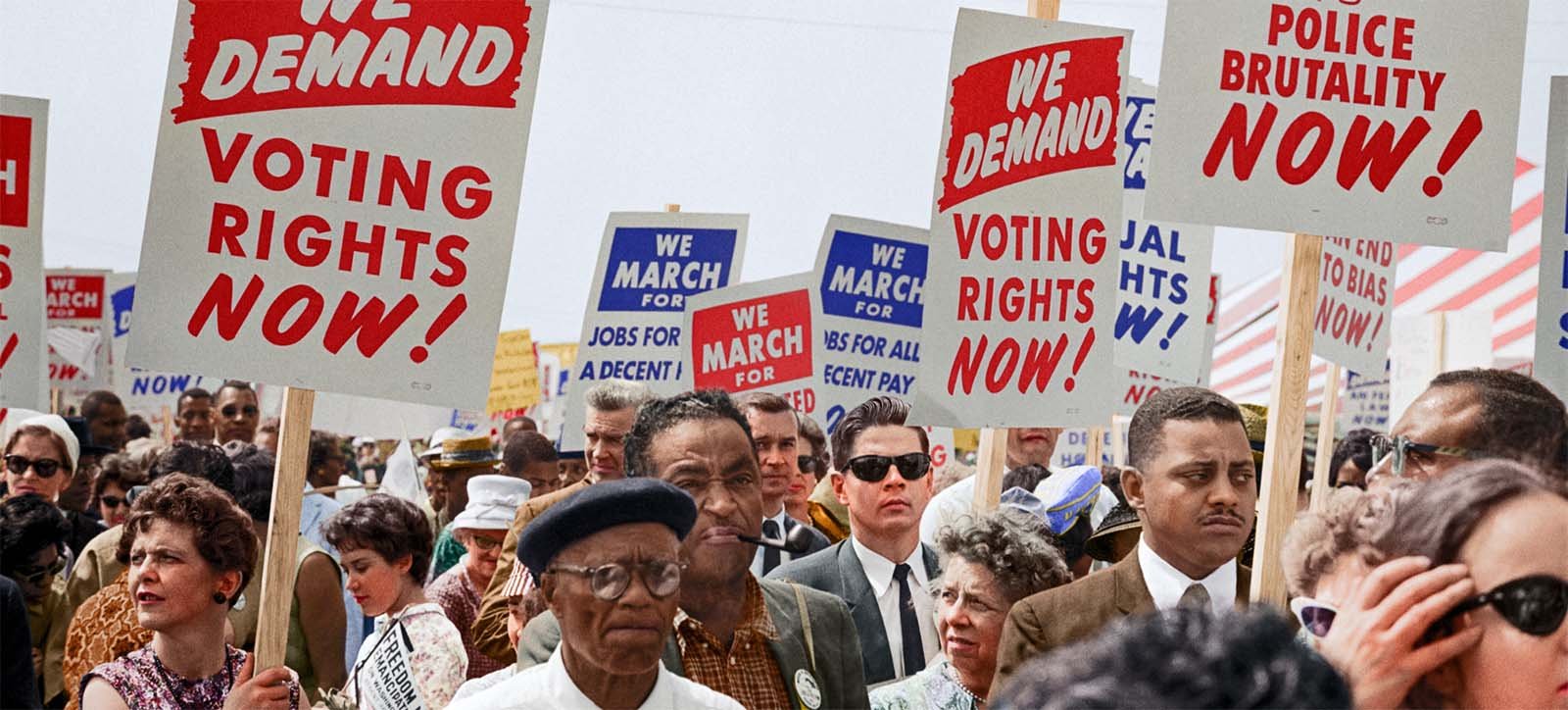Race Relations

“Marchers with signs at the March on Washington, 1963,” original black and white photo by Marion S. Trikosko, https://unsplash.com/photos/9RbdjQ3nCEk
Fierce argument has recently broken out over whether and how to teach secondary school students about race relations—or CRT, for critical race theory. Here in southeastern Pennsylvania, where I live, White parents at a number of school board meetings have expressed worries that their children will be made to feel guilty for the past racist practices of earlier Americans. These parents have demanded to know what is being taught. Administrators trying to protect coverage of racial prejudice within the school curriculum have sometimes abruptly cut off discussion. In one school district, months-long conflict reached a point in mid-November at which a federal district judge granted a preliminary injunction against the school board for curtailing free speech at its meetings.
I grant there is no compelling reason for New Jersey’s counties to retain the traditional term “chosen freeholders” as the name for their elected officials. In a bill signed into law by Governor Phil Murphy on August 21, the title of these lawmakers will become “county commissioners” at the beginning of 2021. The new term certainly conveys better than “chosen freeholder” what these elected representatives do. But there is little basis for tying the older term to the history of slavery or racial prejudice, as many of New Jersey’s political leaders have done.
The political slur “witch hunt” is back. After continually using the term to discredit Special Counsel Robert Mueller’s investigation—84 times over a seven-month period of tweets, by one reporter’s count—President Trump has invoked the term anew to defend against the House Democrats’ impeachment inquiry. Rudy Giuliani, the president’s personal attorney…
On April 20, 1969, an era of student rebellions that had rocked American campuses at Berkeley, Columbia, San Francisco State, and Harvard reached a culmination of sorts with the triumphant exit of armed black students from Cornell’s Willard Straight student union building after a two-day occupation. The students had just won sweeping concessions from the university’s administration, including a pledge to urge faculty governing bodies to nullify reprimands of several members of the Afro-American Society (AAS) for previous campus disruptions on behalf of starting up a black studies program, judicial actions that had prompted the takeover. White student supporters cheered the outcome. And when the faculty, at an emergency meeting attended by 1,200 professors, initially balked at the administration’s request to overturn the reprimands, the radical Students for a Democratic Society (SDS) led a body that grew to six thousand students in a three-day possession of the university’s Barton gymnasium. Amid threats of violence by and against the student activists, the faculty, in a series of tumultuous meetings, voted to reverse themselves, allowing the crisis to end. Student protestors claimed victory for a blow successfully dealt to what they held to be a racist institution.
USF’s faculty know all about our school’s Minority Dissertation Fellowship Program, but members of the wider campus community may not be so familiar with it. Started in 1993 under a grant from the Irvine Foundation, the program supports African-American, Latino and/or Asian-American graduate students with a year of financing and academic resources at USF as they complete their doctoral dissertations. Recipients also gain experience teaching one course per semester. Midway through their fellowship years, the doctoral fellows go on the job market in search of a full-time, tenure-track position in their particular field.
Regarding anti-racism activist Tim Wise’s appearance before 600 people at USF (Foghorn, March 21, 2013), it’s hard to believe that most of the students in that crowd were not “encouraged” to attend by faculty, either as a class assignment or for extra credit. Why would white students of their own free will wish to go hear someone berate them for their alleged racial privilege? I could imagine Wise’s presentation would make students of color feel uncomfortable too. And how about those students who don’t identify so readily with either category?
On Feb. 24, some 250 people jammed into McLaren Hall to hear Bobby Seale interviewed by my colleague, Professor Candice Harrison, of the History Department. The crowd showed an admirable mixture of USF’ers and people from the wider Bay Area community. Bobby Seale exhibited much charm and humor in his replies to Professor Harrison’s questions, relating stories of his rebellious youth along with a moving account of his awakening to racial pride. Toward the end, when he recited by heart and at double-time the long, angry poem that once got him arrested for obscenity on Berkeley’s Telegraph Avenue back in the early 1960s, it brought the house down. I left feeling well entertained.